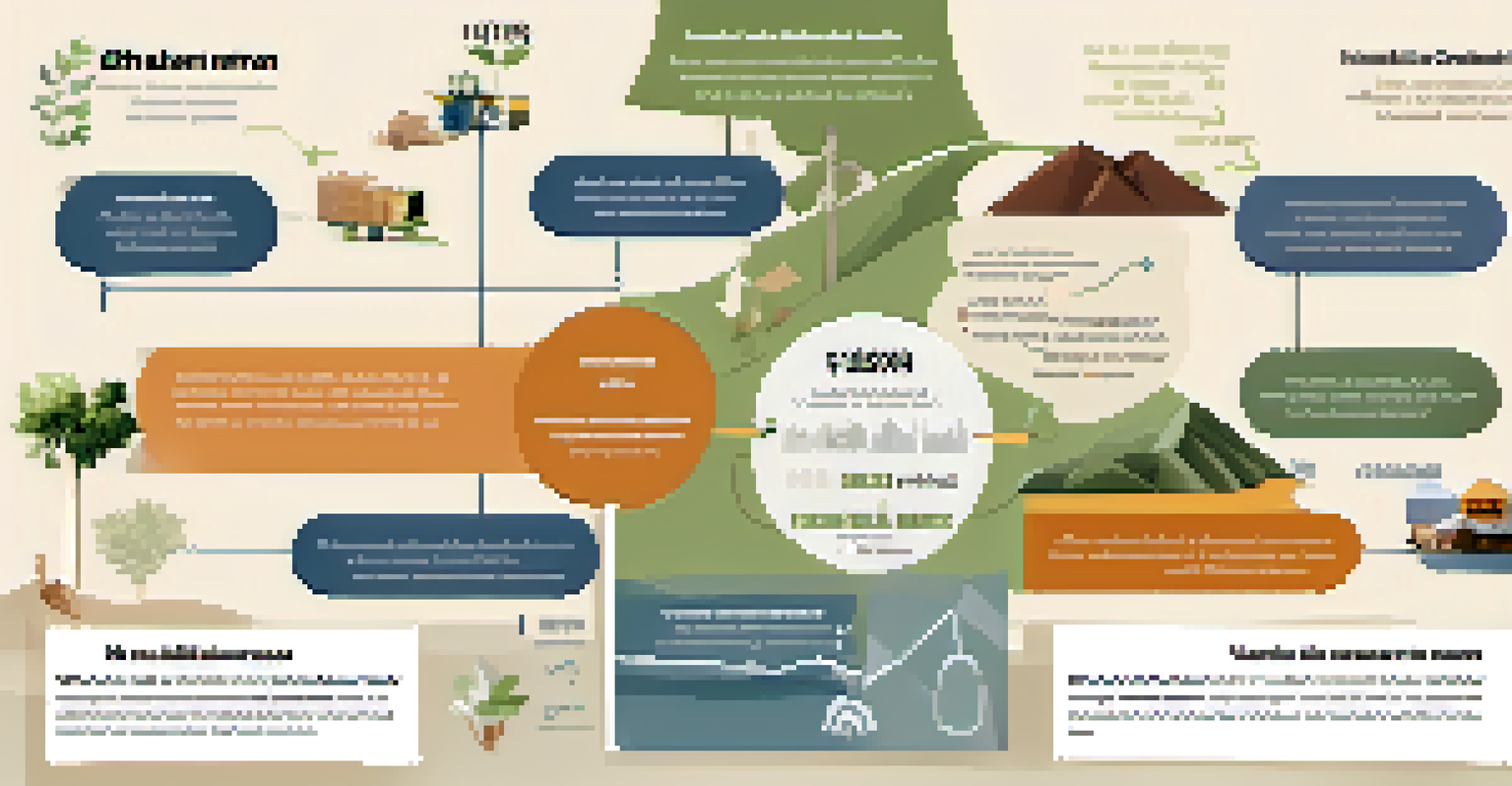Ethical Sourcing: Ensuring Fair Practices in Fashion

Understanding Ethical Sourcing in the Fashion Industry
Ethical sourcing refers to the process of ensuring that the materials and labor used in fashion production are obtained in a responsible and sustainable manner. This means not only considering the environmental impact but also the rights and welfare of workers involved in production. By prioritizing ethical sourcing, brands can create a positive impact on communities and ecosystems.
Fashion is not just about clothes; it’s about the stories behind them, the people who make them, and the impact they have on the world.
In essence, ethical sourcing is about transparency and accountability throughout the supply chain. It challenges brands to look beyond profit margins and consider the human and environmental costs of their operations. As consumers become increasingly aware of these issues, ethical sourcing is transitioning from a niche concern to a mainstream expectation.
Many consumers now demand to know the story behind their clothing, including where materials come from and how workers are treated. This shift puts pressure on brands to adopt ethical sourcing practices, making it essential for companies to communicate their efforts and values effectively.
The Importance of Fair Labor Practices
Fair labor practices are a cornerstone of ethical sourcing, ensuring that workers receive fair wages and safe working conditions. Many garment workers, especially in developing countries, face long hours, low pay, and unsafe environments. By committing to fair labor practices, brands can help uplift these communities and improve lives.

Moreover, fair labor practices contribute to a more stable workforce. When workers feel valued and secure, they are more likely to produce high-quality products. This not only benefits the workers but also enhances the brand's reputation and customer loyalty in a competitive market.
Ethical Sourcing Boosts Transparency
Prioritizing ethical sourcing fosters transparency and accountability in the fashion industry, allowing consumers to understand the origins of their clothing.
Brands that prioritize fair labor practices often see a positive shift in consumer perception. Shoppers are more inclined to support businesses that demonstrate a commitment to ethical treatment of workers, which can lead to increased sales and brand loyalty over time.
Sustainable Materials: A Key Component of Ethical Sourcing
Sustainable materials play a vital role in ethical sourcing, as they reduce the environmental impact of clothing production. Organic cotton, recycled polyester, and Tencel are just a few examples of materials that are kinder to the planet. By choosing sustainable options, brands can minimize resource depletion and pollution.
Sustainability is no longer a trend; it is a necessity in the fashion industry.
Furthermore, using sustainable materials often encourages brands to adopt more innovative practices. For instance, some companies are exploring biodegradable fabrics or using waste materials to create new products. This creativity not only helps the environment but also sets brands apart in a crowded marketplace.
Consumers are increasingly drawn to brands that prioritize sustainability. By showcasing their use of eco-friendly materials, companies can appeal to environmentally conscious shoppers and differentiate themselves from competitors who may still rely on conventional, harmful practices.
The Role of Certifications in Ensuring Ethical Standards
Certifications play a crucial role in verifying that brands adhere to ethical sourcing standards. Labels such as Fair Trade, Global Organic Textile Standard (GOTS), and OEKO-TEX provide consumers with assurance that products meet specific social and environmental criteria. These certifications can significantly enhance a brand's credibility.
However, navigating the world of certifications can be overwhelming for both brands and consumers. It’s essential for brands to choose certifications that align with their values and business practices. By doing so, they can confidently communicate their commitment to ethical sourcing to their customers.
Fair Labor Uplifts Communities
Implementing fair labor practices not only provides workers with safe conditions and fair wages but also enhances brand reputation and consumer loyalty.
For consumers, understanding these certifications can empower informed purchasing decisions. When shoppers recognize trusted labels, they can feel confident that their buying choices contribute positively to social and environmental causes.
Building Transparency in the Supply Chain
Transparency in the supply chain is essential for ethical sourcing, as it allows consumers to trace the origins of their clothing. Brands that share information about their sourcing practices and production processes build trust with their audience. This openness can help dismantle skepticism about the fashion industry’s commitment to ethical practices.
One way brands can enhance transparency is by utilizing technology, such as blockchain, to track products from production to sale. This innovative approach not only provides consumers with detailed insights but also holds brands accountable for their practices. Enhanced transparency fosters a sense of responsibility within the industry.
As consumers increasingly demand transparency, brands that embrace this practice will likely stand out. Those who are willing to reveal their supply chain processes can attract a loyal customer base that values honesty and ethical considerations.
Consumer Responsibility in Ethical Fashion Choices
Consumers play a significant role in promoting ethical sourcing by making informed fashion choices. By prioritizing brands that demonstrate ethical practices, shoppers can support companies that contribute positively to society. This collective action can drive significant change within the fashion industry.
It's essential for consumers to educate themselves about the brands they support. Researching a brand's sourcing practices, labor conditions, and commitment to sustainability can empower individuals to make choices that align with their values. Awareness leads to more responsible consumption.
Sustainable Materials Matter
Utilizing sustainable materials reduces environmental impact and appeals to eco-conscious consumers, helping brands differentiate themselves in a competitive market.
Ultimately, when consumers demand ethical sourcing, brands are more likely to respond. This shift not only benefits workers and the environment but also creates a fashion industry that values ethics and sustainability as fundamental principles.
The Future of Ethical Sourcing in Fashion
The future of ethical sourcing in fashion looks promising as more brands recognize its importance. With consumers increasingly prioritizing ethical considerations, companies are motivated to adopt sustainable and fair practices. This evolution will likely lead to a more responsible fashion industry overall.
As technology continues to advance, we can expect innovative solutions that further enhance ethical sourcing efforts. For instance, AI and data analytics can help brands optimize their supply chains and ensure better labor practices. This integration of technology will empower brands to meet the growing demands for transparency and sustainability.

Ultimately, the movement towards ethical sourcing is not just a trend but a necessary shift in the fashion industry. As brands embrace these principles and consumers advocate for change, we can look forward to a future where fashion is synonymous with fairness and responsibility.